Something Easy to Draw With Love Ppl
Is that a cute little bee you're doodling, or did something a little Freudian slip out of your subconscious? Some may say doodling is kid stuff . Or it means you're not paying attention (in reality it's just the opposite!). The truth is your daydream drawing gives you an unobstructed view into your own mind. Cool, right? Let's dig into the hidden meaning of doodles.
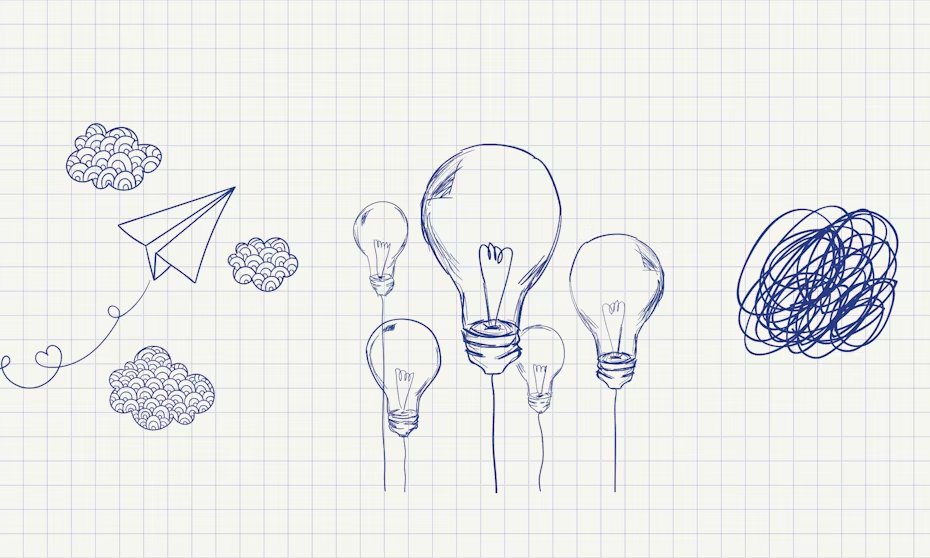
Some of history's most influential people were doodlers, and you'd be surprised at how many goofy stick figures decorate the margins of famous historical manuscripts.
Notable doodlers include too many U.S. presidents and legendary authors to list. Doodling even left its mark in mathematics: the Ulam spiral, a popular visual aid for mathematicians, was developed by Stanislaw Ulam based on a doodle he made while attending a conference .
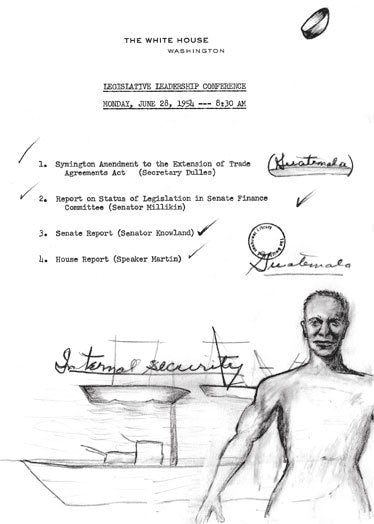
Science also backs up the importance of doodling.
- Doodling helps you pay attention. Despite popular belief, doodling actually keeps you focused by creating just enough stimulation to prevent your brain from reverting to its default state, or "spacing out."
- Doodling gives you an emotional outlet. If you have trouble communicating or putting emotions into words, doodling can help you express your feelings, even calm you down if you're frustrated, anxious or depressed.
- Doodling enhances creative thought . The mental state of doodling is between awareness and daydreaming, which makes it great for new, creative ideas. It relaxes you just enough that something in the back of your mind can come to fruition naturally.
But perhaps most importantly: doodling gives you rare insights into your own psyche.
Different people doodle different things, and even the same person will doodle different things depending on their mood. These aren't random. Just because you're doodling absent-mindedly doesn't mean your mind is absent.
The 99design team doodles all the time, and we wanted to learn more about what was behind their scribbles. So, we snagged 15 real doodles from our staff and researched the meaning of them based on work from artists and handwriting experts .
Here's what we found out.
People
—
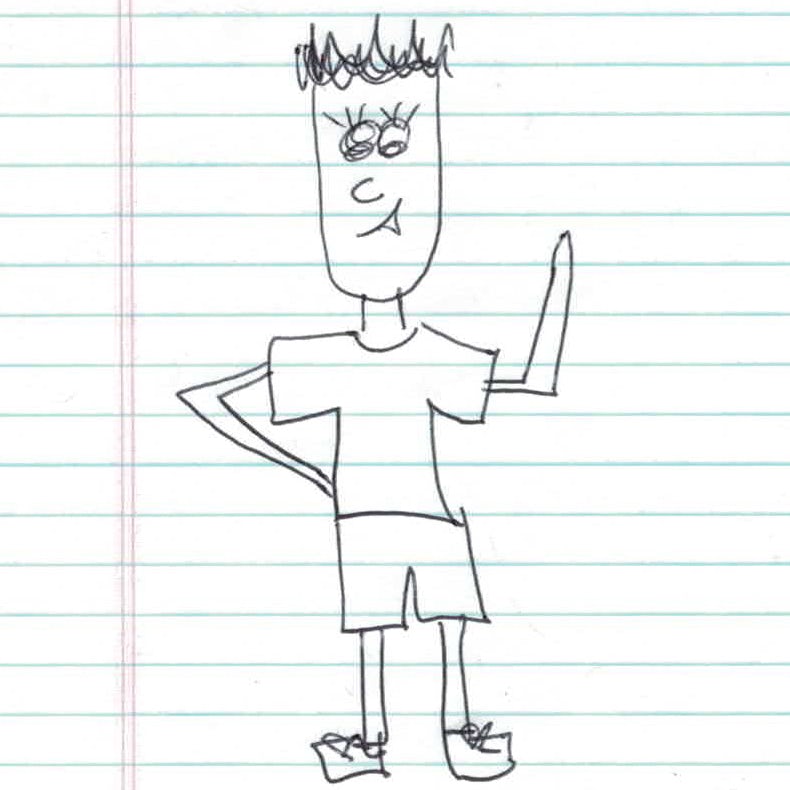
What do our doodles say about ourselves? How about we start with doodles of ourselves.
Drawing human figures indicates a successful person: someone with a healthy self-image who connects identity to a complete body. It suggests a person is in control of their emotions and can achieve their goals.
How realistic the doodle is (whether it's detailed or a simple stick figure) doesn't matter. That only shows how much artistic training the doodler has, not the meaning behind it.
Faces
—
Faces alone are worth a closer look. Before diving into the hidden meaning of these doodles, you first have to determine whether the doodle represents how the creator sees themselves or other people.
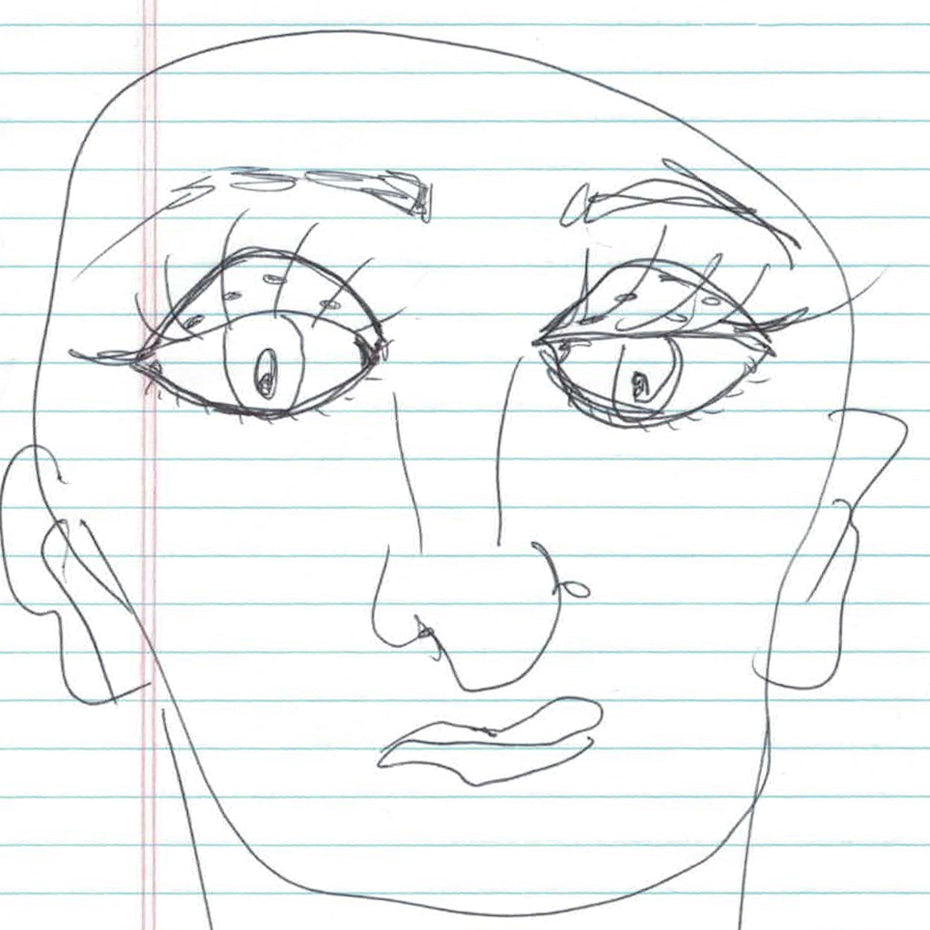
In general, beautiful and attractive faces reflect a positive and optimistic outlook. Ugly faces represent a negative or distrustful view.
Pay attention to the eyes and the mouth. Extra detail on eyes could suggest a desire to be noticed. Or it could mean the artist feels like they're being watched or their privacy is invaded (what does that say about anime artists?). Lush, voluptuous lips can mean a deep-seated, secret desire.
Face shape and style is also telling. Cartoonish face doodles signify a need for attention. Wide, circular faces mean innocence (think of a smiley-faced sun), and neediness. Even the direction of the face is telling; profiles tend to be popular among introverts.
Flowers
—
Flowers are one of the most popular drawing motifs, ingrained in us from childhood. While they're commonly drawn by women, it's not unusual for men for doodle them as well.
Flowers indicate a gentle, passive or even fragile nature. They're delicate and, pretty as they are, they are very susceptible to the forces around them.
- Circular flowers with rounded petals — One of the most positive flower doodles. The more circular a flower is, the more amicable the drawer is.
- Circular center with pointy leaves or thorns — The circular center represents a kind-hearted individual, but the pointy leaves indicate distrust or defensiveness. This might be the doodle of a scorned lover or those known for pushing others away.
- Perky vs. droopy — Perky flowers point to openness and a carefree attitude. Droopy or dying flowers, however, suggest an unwillingness to open up.
Today, flowers are also associated with environmentalism, so people thinking deeply on green issues might find themselves doodling flowers.
Squares, cubes and checkerboards
—
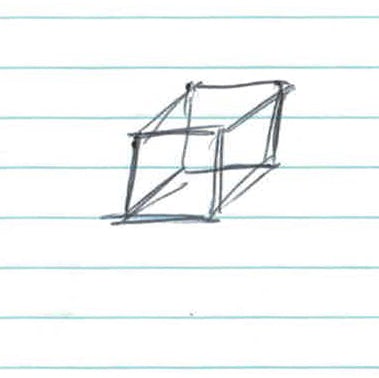
Nothing says structure quite like squares, boxes and cubes.
This kind of doodles typically indicates a person who is efficient, analytical, and in control. If you haven't solved your problem yet, then you're working through it logically.
This is doubly true with a checkerboard, which suggests patience and persistence as the doodler weighs every option.
Beware if your boxes form a pile or stack. Then, you may be feeling overwhelmed.
Bricks
—
Nothing says blocked or restricted like a brick wall.
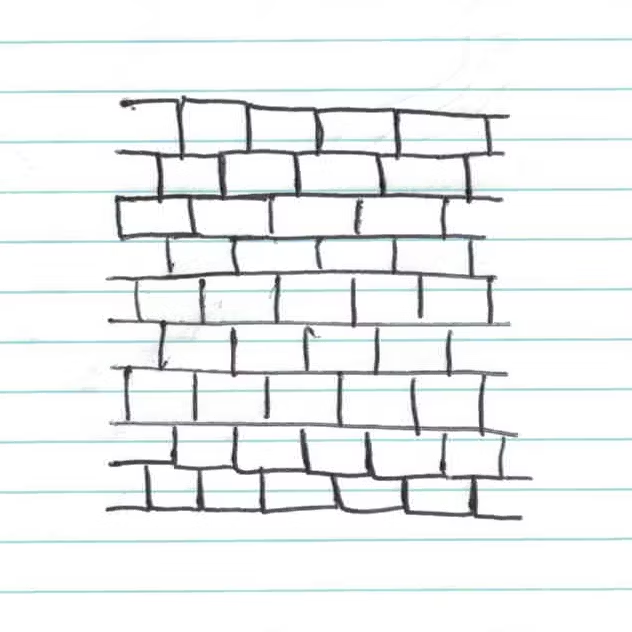
Tightly packed brick doodles indicate some obstacle in between you and your goals.
Scattered or unconnected bricks indicates a positive association with walls, like planning a new home or the place you met a schoolyard crush.
Arrows
—

Simple to draw and packed with meaning, arrow doodles might be basic signs for direction or Katniss' favorite weapon.
What really matters is where it's pointing.
Upward-facing arrows show ambition, optimism or motivation. Downward-facing arrows show dread, pessimism or worry.
Always pay attention to what is drawn with an arrow. This will show exactly what you're striving for. An obvious example: arrows drawn with hearts are obvious signs of a desire for love.
Flying animals
—

You already know about the birds and the bees, but what about butterflies, dragonflies and other flying creatures? While they may seem cutesy or romantic, their true meaning is really a desire to be free and not tied down. Doodles of flying animals may crop up more if you feel strained by a particularly frustrating project.
Don't mix flying animals up with transportation vehicles like airplanes, though. More on those later.
Houses
—
Like flowers, houses are a common motif instilled in us during childhood. These doodles typically represent one's home life or sense of security, and how they're drawn indicates the doodler's feelings about that. For example, a nice, tidy drawing shows a healthy home life, while a messy or asymmetrical one reveals trouble.
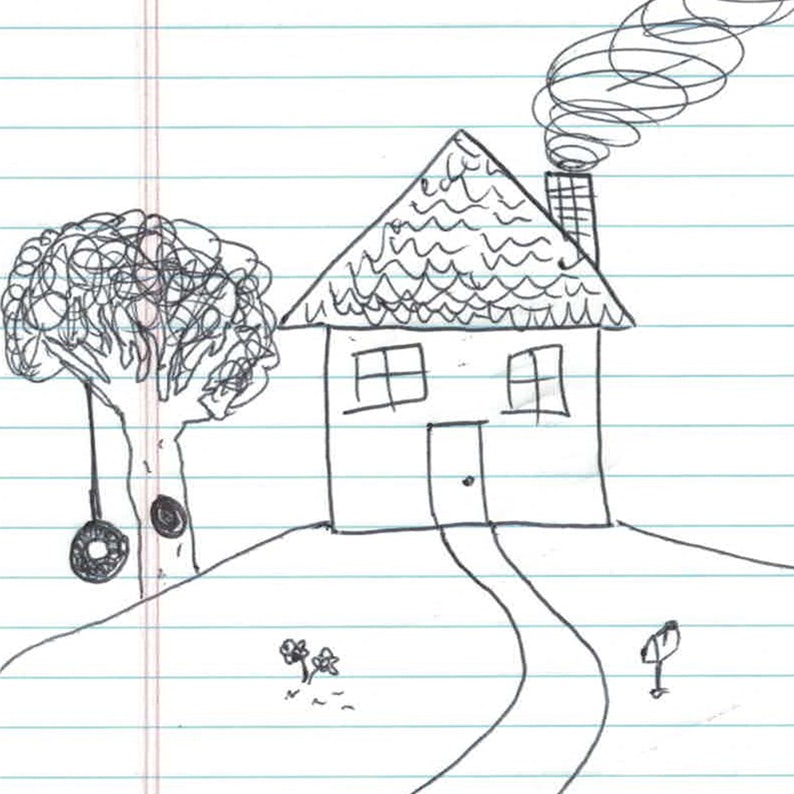
Some common details to watch out for:
- No windows — Indicates unhappiness or feeling trapped
- On top of a hill — Loneliness or isolation
- Smoke from a chimney — A warm fire inside and a good sign
Bear in mind that there are cultural and architectural variations. Someone who grew up in a city apartment might not identify with the traditional "square house with a triangle roof."
Ladders and stairs
—

Whether it's career ambition, personal improvement or even spirituality, ladder and stair doodles indicate working towards a goal.
The style of your doodle reveals your attitude about the struggle.
Firmly drawn lines show confidence, while shaky or uneven lines show uncertainty.
Names and initials
—
This one's easy. Doodling names or initials shows who you think about the most—even if it's yourself! This holds true regardless of whether it's a stylistic drawing or simple lettering, although the size of the doodle can relate to how much importance you give this person.
Squiggles and zigzags
—
Even simple line doodles can reflect your inner-thoughts, as long as they have some character to them.

Squiggly lines suggest the middle-ground between direction and exploration. You may know where you need to go, but not how to get there.

Angular zigzags are different. Their straight lines and sharp corners denote aggression or impatience, and are commonly associated with masculine traits.
Transportation vehicles
—
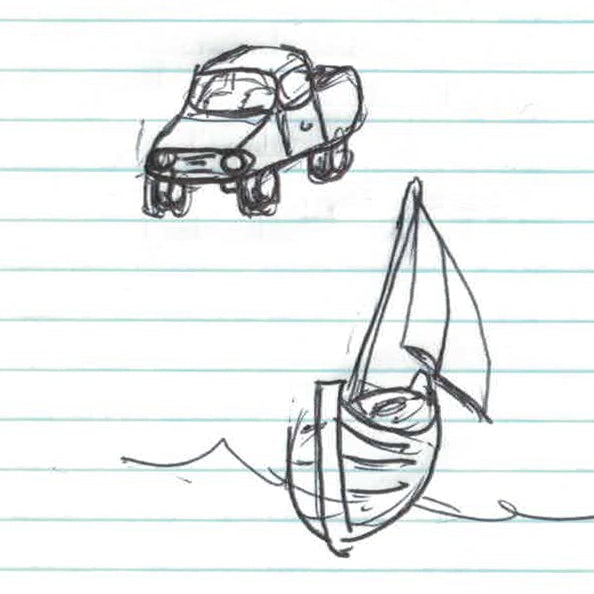
Planes, trains and automobiles (and trucks and boats and hot-air balloons…) represent mobility, moving or escape.
For better or worse, these doodles reflect an urge to "go someplace new," whether physically or psychologically.
Someone who wants a new job or someone planning a wedding might find themselves both drawing cars.
Stars
—
Stars have a variety of meanings depending on how they're doodled. They denote ambition, motivation, and confidence, but paying attention to the details can add even more insight.

A bunch of small stars indicates optimism. One big star suggests a singular goal that stands out over others. Organized and uniform stars show focus and dedication. Chaotic and asymmetrical stars reflect an energetic free-thinker.
Spider webs
—
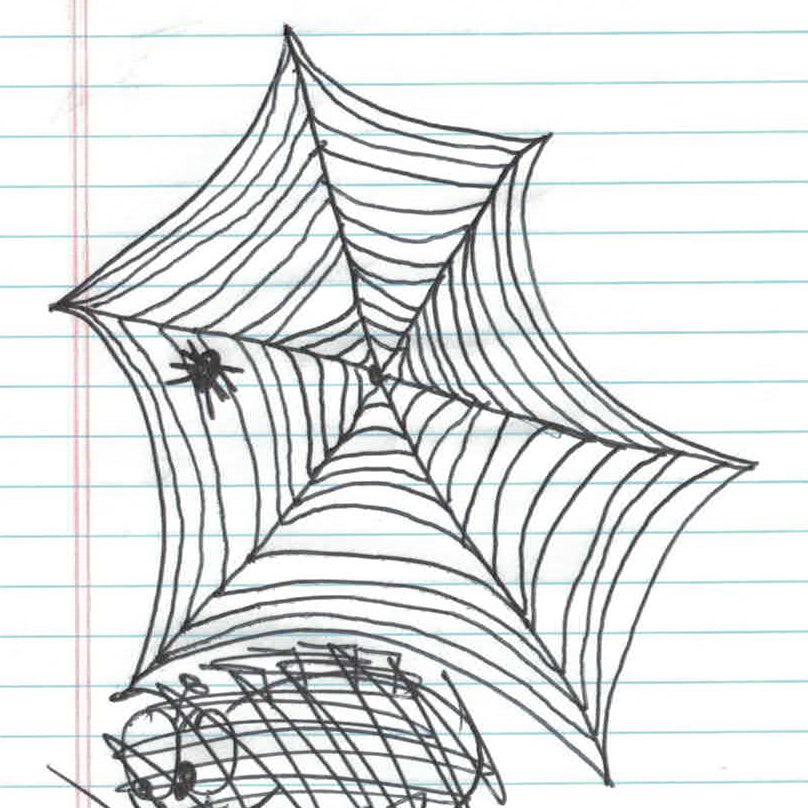
As you can guess, a spider web doodle represents feeling trapped or stuck. But, it doesn't always mean the doodler is the one who feels trapped. Sometimes the artist wants to ensnare someone else!
Where did you doodle?
—
It's not just what you draw, but where you draw it. On a blank page, you're free to doodle anywhere, so your first impulse might say something more about you.
- Center — Drawing in the center can mean one of two things. The first is a need for attention or egotism (who cares about wasting paper?) and it's typical of extroverts. The second is a desire for open spaces, creative expressions or rebellion against restrictions.
- Top — The top of the page is the most important, so doodlers feel that their opinion is more important than whatever's being discussed. It's typically indicative of energetic, free-thinking and spiritual people.
The left and right sides are tricky to diagnose because they're often decided by external factors (like whether the doodler is left- or right-handed) or how much room the bookbinding leaves. Take the following interpretations with a grain of salt:
- Left — The doodler focuses on the past, whether nostalgia or regret, with a reluctance to move forward. Coincidentally, this is the most common area for doodling.
- Right — The place usually reserved for notes, doodling in the right margin could indicate an urge to communicate internal feelings.
…But sometimes a squiggle is just a squiggle
—
Discovering the meaning of doodles isn't an exact science. There are tons of unpredictable factors and ambiguity to make concrete assessments. Someone who's allergic to flowers might have a negative association with them, and that messes up the interpretation. When analyzing doodles, it's best to take a step back and go with your gut!
What do you usually doodle? What do you think is meaning of doodles? Share your thoughts in the comments.
Source: https://99designs.com/blog/creative-inspiration/meaning-of-doodles/
0 Response to "Something Easy to Draw With Love Ppl"
Post a Comment